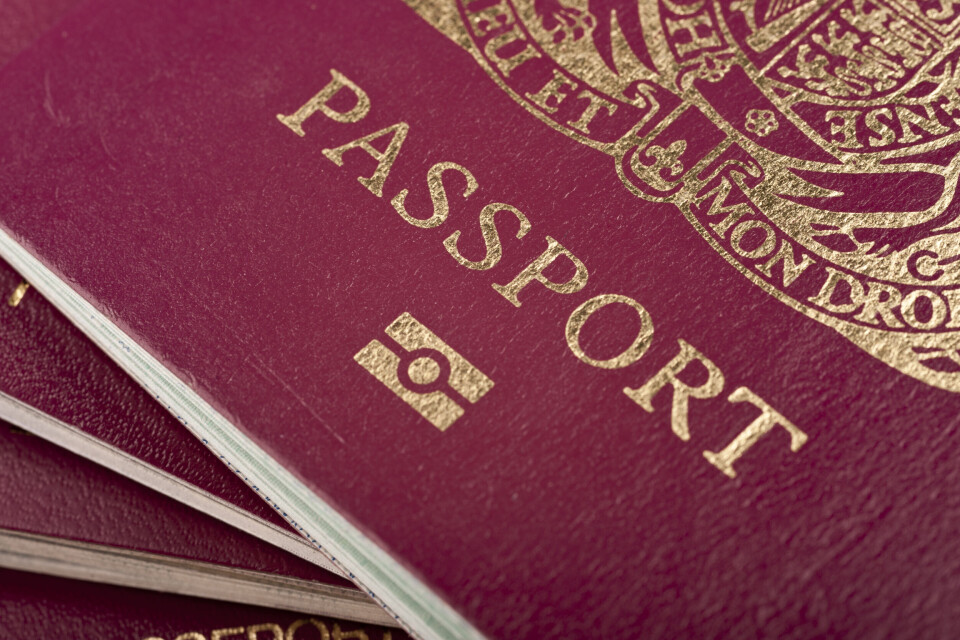-
Britons are the largest foreign community of second-home owners in Nouvelle Aquitaine
See which other departments in the region are popular with British nationals
-
Travellers risk extra costs under new Eurotunnel ticket rule
Some fare options are less flexible and less forgiving of lateness
-
May will be difficult month for train travel in France, warns minister
Two major train unions are threatening to strike and are ‘not willing to negotiate’, he says
'Passport date issue stopped our travel UK to France and elsewhere'
A lack of clarity over passport expiry dates 'has left me with no holiday and no compensation', says one traveller who said she was denied boarding with P&O

Confusion over the rules surrounding British passport validity have prevented several Connexion readers from reaching their destination in France or elsewhere in Europe.
One British reader was denied boarding on an Air France flight over the issue, while another woman lost hundreds of pounds after wrongly not being allowed to fly with EasyJet.
The passport validity issue has arisen since UK citizens became third party nationals after Brexit came into effect, meaning they have been subject to the passport rules for non-EU member states when travelling to the bloc.
This means that their passport must meet two criteria:
- Be valid for at least three months after the date they intend to leave the EU country they are visiting
- Have been issued within the previous 10 years.
For the second point, the European Commission’s Migration and Home Affairs Department has told The Independent that: “Entry should be allowed to those travelling with passports issued within the previous 10 years at the moment of entry into the Schengen area.
“The condition that the passport must have been issued within the previous 10 years does not extend for the duration of the intended stay. It is enough that the condition is fulfilled at the moment of entry.”
It is possible to have a passport that is still valid but which was issued more than 10 years ago because, before September 2018, the UK had a policy of crediting passport-holders for ‘unspent time’ on their previous passports.
This meant that the documents could be valid for up to 10 years and nine months. In this way, for example, a passport issued on July 24, 2012, could have an expiry date of April 24, 2023.
Read more: Post-Brexit passport rule confusion affects British travellers to EU
However, several British people have been told by their travel operator that they are being refused boarding because their passport will not be less than 10 years old for the whole duration of their stay in Europe.
This may be because although the UK government advice states that the document must be less than 10 years old “on the day you enter” the EU, it also adds that “for some Schengen countries your passport may need to be less than 10 years old during your whole visit.”
The UK Foreign Office added that it was seeking clarification from the European Commission on this point, and when contacted by The Connexion, a spokesperson said that requirements for entry into the EU were the responsibility of member states.
"The UK Government is in contact with the European Commission to clarify its rules of entry for British passport holders,” he added.
"FCDO travel advice will continue to be updated in line with any updates to their border guards handbook. Airlines are expected to follow official guidance provided by states on their entry requirements."
The French visa authorities state on their website that people entering the country must present on arrival: “a valid passport which is less than 10 years old and which will be valid for three months after the envisaged date of departure.”
They do not mention a passport needing to be less than 10 years old for the duration of your stay in France. The European Commission website also states that the same rules apply for “travel within the EU” apart from Ireland, which is the only country where the regulations differ.
The Connexion contacted the French consulate for confirmation; we were directed back to the European Commission page - suggesting that France does follow general EU rules - but the spokesperson would make no further comment on the matter.
Despite this, some travel operators appear to be following the ‘less than 10 years old during the whole visit’ rule, only accepting passports which are less than nine years and nine months old.
This would mean that they have more than three months validity and will also be less than 10 years old for the whole duration of a European trip, but as the European Commission states, this is not necessary.
‘Let down by the airline and the UK government’
Kerry Ireland was refused boarding with Air France when travelling to Paris with her partner Nigel on March 18.
“My boyfriend and I, like many people, had to cancel our travel plans for two years running due to Covid,” she told The Connexion.

“Finally, things began to open back up and we were able to plan a trip away this year for our anniversary,” a five-day trip to Paris.
“We booked our flights, accommodation plus several trips and excursions, such as tickets to a show at the Moulin Rouge, Eiffel Tower, Seine Dinner Cruise, and The Louvre to name but a few.”
Ms Ireland, who is an account manager and new business specialist for luxury hotels, added: “We both checked the guidelines for travelling to France on the government website and discovered that we needed three months left on our passports to travel.
“Our passports were both in date; my expiry was January 2023 meaning we both had enough months left to travel.”
Ms Ireland’s passport was issued on April 23, 2012, meaning that it was still less than 10 years old and with more than three months’ validity on it at the time of attempted travel.
However, when Ms Ireland and Nigel arrived at Birmingham airport, “the chap behind the check-in desk scanned both passports and then looked perplexed.
“He appeared to scan them again and then said he needed to speak to his supervisor. He returned a minute or so later and said that my passport had expired.
“We were initially in shock but then we pointed out that my passport expiry was January 2023, not January 2022, leaving 10 months to travel.
“I questioned why he was saying my passport had expired and he informed us that although my passport was shown well within date, the expiry date was actually incorrect, as my passport was issued in April 2012 and the extra months granted were no longer valid.
“As you can imagine, this was horrifying news. We asked to speak to a supervisor and were told that there was nothing anyone could do, we were not going to be able to travel.
“He said that it was due to Britain leaving the EU and the ‘extra months’ once granted by the EU were no longer valid. Had we stayed in the EU we would have been allowed to travel.
“We left the airport feeling disgusted, angry and extremely upset.”
Later that day, Ms Ireland contacted the passport office, who told her that “although the passport was valid I could not fly on it as it had expired as an EU travel document.”
“We were told that we should have known this and that it was advertised and was on the government website. I have checked and it wasn't.
“We asked for an appointment at the office to renew my passport to try and salvage our trip. We were willing to drive to Peterborough but we were told there were no walk-ins and the next appointment was the following Tuesday.
“We explained the situation but we were told there was nothing they could do. Our holiday was over, we were absolutely devastated. We asked to make a complaint but the adviser said he couldn't take details over the phone.
“I then made contact with Air France. We had inputted our passport details [when booking the trip] and nothing had flagged up.
“They have been good enough to provide us with a travel voucher as they understood our situation.
“We then spent the day trying to cancel all our trips, excursions and restaurants. Thankfully the accommodation in France were lovely and did not charge us.
“We managed to cancel a few trips but most were non-refundable, therefore we have lost money. We later discovered that we were also not covered by our travel insurance.”
Ms Ireland has since made several unsuccessful attempts to lodge an official complaint with the passport office via phone and email. “The third time [I called] I was on hold for over one and a half hours before being cut off,” she said.
“We cannot believe that such a catastrophic and fundamental issue can be allowed to happen and for people to be treated this way.
“What occurred is absolutely disgusting. We have been left with no holiday yet again due to no fault of our own. We have been left feeling hollow, sickened and let down by the airline and the UK government.
“The stress and anxiety this situation caused was horrendous and no one should have to go through this again.”
The Connexion has contacted Air France to ask why Ms Ireland was turned away and whether this was due to an error.
£13 in compensation for incorrectly denied boarding
Annie Jefferies, a retiree who lives in Devon, was wrongly refused boarding on an EasyJet flight from Bristol to Geneva when travelling to see her seriously ill brother-in-law in October 2021 because of an even stricter interpretation of the rules.
Mrs Jefferies’ passport was issued in November 2011, but extended to May 2022, so when she arrived at the airport it was both less than 10 years old and with more than three months’ validity remaining on it.
She reached the gate “with no issues” but was then “told very firmly” that she would not be allowed to fly, the staff member at the gate telling her that “my passport was out of date as I did not have six months left.”
This was incorrect both because Mrs Jefferies only needed three months validity plus the four days she would be spending in Europe, and because – with the extension – her passport had six months and eight days left on it.
The EasyJet crew member would not accept this, however, saying that the passport needed to have six months validity remaining within its original 10-year period.
“Once I had been escorted out of the airport building by the security guard, I rang my sister in Geneva who was extremely upset and said that she was sure this was incorrect information, but by then the flight gate had closed and I had no option but to collect my car from the airport parking lot and return to Tavistock,” she said.
“I was extremely upset; I am 73 years old and do not expect such an uncaring and dismissive attitude,” she said.
Mrs Jefferies then had to apply for an emergency passport, costing £177, book onto a later return flight to Geneva, which came to £196 and cancel her hotel booking, for which she lost £217.
She also wasted 218 miles’ worth of petrol travelling to and from the airport and her £62 car parking, which she had to rebook for a later date at a cost of £81.
Mrs Jefferies was later told by EasyJet customer service that she should have been allowed to board the flight, but said she was “disgusted” to then only be offered £13 in compensation.
She wrote to the airline demanding further compensation but was told “that there was no more that they could do as this was government policy.
“The lady that I saw at the passport office suggested that I should take this issue up with the government, but I could not face it as I had already wasted a great deal of time trying to deal with EasyJet.
“I didn’t feel that I would get anywhere fighting the government!
“The whole incident was quite disgraceful and caused much distress to my family,” she told The Connexion.
We have contacted EasyJet to ask why this situation arose, and how “government policy” prevented the airline from paying more in compensation.
EasyJet has previously told The Connexion: “We have recently made some changes to the wording on the guidance provided on our website and to ground crew, to ensure this is clear and so avoids this being misinterpreted."

Credit: David and Sarah Asplin
Watch out for the 10-year cut-off
On another occasion, EasyJet was right to refuse boarding to a Connexion reader, whose passport was more than 10 years old on the day of travel.
Sarah Asplin, who runs gîtes and a small campsite in Brossac, Charente with her husband David, was unable to board an EasyJet flight from Bristol to Bordeaux in April.
She had travelled to the UK to meet her new granddaughter, and was returning to France on April 1.
However, her passport had been issued on August 4, 2011, so although it was still technically valid because of an extension added to it, it was more than 10 years old.
“The passport still had six weeks of validity on it but EasyJet staff explained that the new [post-Brexit] rules meant UK passports are now only valid for 10 years from the date of issue,” Mr Asplin told The Connexion.
“Fortunately, my wife has dual citizenship and was able to use her second passport to make the flight. Thank heavens she had her Irish passport with her!” Mr Asplin added.
Related articles
‘We plan to sell our French second home due to the 90/180 day rule’
Do French photo booth codes work for online UK passport applications?
Brexit updates: residency cards, passport stamps, UK-France deliveries
























